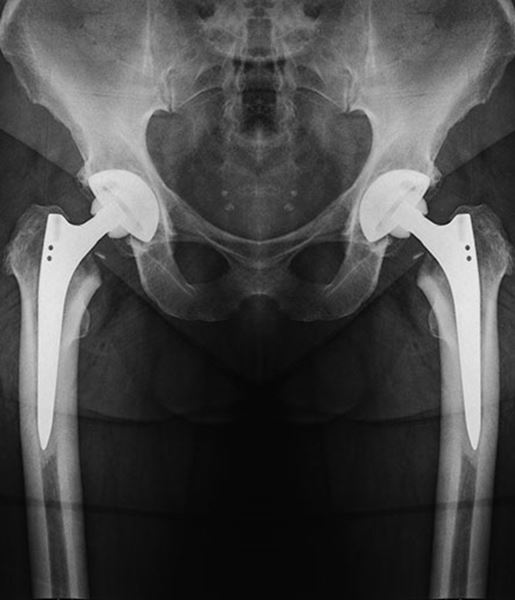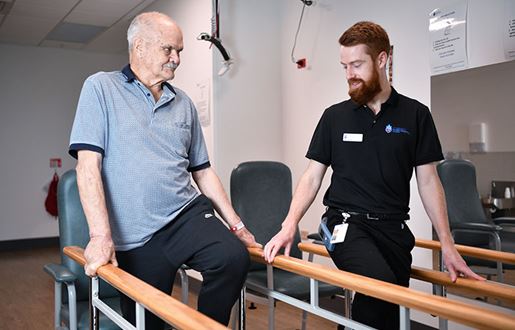Bilateral Hip Replacement
- Home
- Services
- Orthopaedics
- Hip Orthopaedics
- Hip Replacement
- Bilateral Hip Replacement
What is a bilateral hip replacement?
Some patients have degenerative problems in both hips that can cause severe pain and reduced mobility. If this significantly interferes with your ability to perform everyday activities and non-surgical support is no longer effective, your doctor may recommend a bilateral hip replacement.
Also known as a double hip replacement, this simply refers to a total hip replacement procedure that is performed on both sides of the body. It can either be carried out simultaneously in the same operation, or as a staged procedure. The damaged parts of the hip joint are replaced with ceramic, metal or plastic parts that mimic the natural movement of the hip.
During the procedure, the ball-shaped femoral head at the top of the thighbone is removed and replaced by an artificial ball and stem. The damaged surface of the socket is also replaced, and a ceramic or plastic spacer is inserted between the ball and socket to facilitate a smooth and gliding movement.
Is it right for me?
The decision to have hip replacement surgery is very personal and should be taken in conjunction with ongoing medical advice from your treating doctor. The most common reason for a bilateral hip replacement is usually severe arthritis. This condition can greatly impact everyday life activities causing severe pain, stiffness and reduced mobility.
There are benefits and risks to a simultaneous bilateral hip replacement. Advantages may include one operation, one anaesthetic, and one recovery. However, there are additional risks involved with a longer surgery, a longer hospital stay, and possibly a longer recovery. Whilst the staged procedure can avoid many of these risks, it does involve separate operations each with their own rehabilitation and recovery periods. The most suitable patients for simultaneous bilateral hip surgery tend to be younger, active and generally in good health so that they are able to comfortably manage the demands of the procedure and the rehabilitation process.
Preparation
Preparing for your bilateral hip replacement is an essential step towards ensuring a smooth surgery and recovery. Before the surgery, you will need to attend a pre-operative assessment to undergo necessary tests and evaluations. This helps in ensuring that you are fit for the surgery and to identify any potential risks. Staying active is key; strengthening the muscles around your hip will aid your post-surgery recovery. Gentle exercises like walking and swimming are recommended in the lead-up to your operation. Additionally, you might be introduced to a physiotherapist who can provide specific exercises to further assist you.
Follow up
After undergoing a bilateral hip replacement, it's essential to adhere to a follow-up care plan to ensure optimal recovery and long-term success of the procedure. Typically, you will have your first post-operative check-up within a few weeks of the surgery to assess wound healing and ensure there are no immediate complications. During these visits, your orthopaedic surgeon will evaluate the function of the new hip joints, monitor for any signs of loosening or wear, and may order X-rays or other imaging studies.

Hip replacement approaches
Other hip surgeries
Bilateral Hip Replacement FAQs

How much will my hip surgery cost?
Understanding the cost of your treatment is an important consideration before committing to surgery, but it’s not always easy to find the information you need. Learn more about the factors which contribute to the cost of your surgery:
What will my treatment and recovery look like?
Familiarising yourself with your treatment program and understanding the recovery process are important steps to take on the pathway to surgery.

Find a hospital with orthopaedic services
Our Hospitals
Related services

Hip Orthopaedics
We provide specialist care and expertise for a range of problems affecting your hips.
Read More
Total Hip Replacement
This surgery replaces the damaged parts of your hip with artificial materials.
Read More
Find a Specialist
Talk to our world-leading orthopaedic specialists about the most suitable treatment options.
Read More